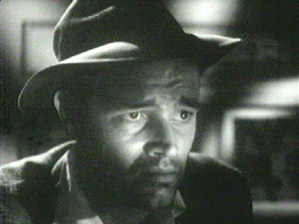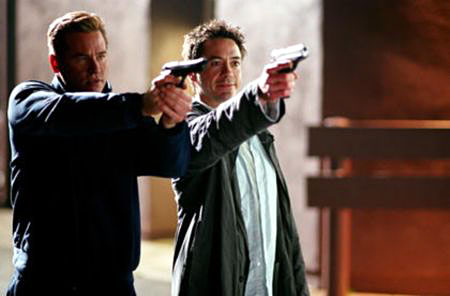
In his article, “Questions of Genre,” Steve Neal discusses the genesis of genres: what distinguishes one genre from another and the role of verisimilitude in identifying different aspects of genres. These probabilities that occur within each genre make it more familiar, helping the audience draw conclusions about the film. For example, if a picture is classified as a musical, the audience will not be completely freaked out when every single character simultaneously breaks out into song and also happens to be a professionally trained dancer. If one were watching a movie classified as film noir and this occurred, the audience would have no idea what to make of it, and it would seem out of place. Because the audience would already be aware of the musical classification, the story being told in song will be normal and expected.
In classifying genre, the media and the studios are outlining a narrative image, a description of what to expect. These expectations are as much attributed to plot as they are to moral messages influenced by the time in which the movie is set: Western films reflect patriotic, good-natured hope; film noir expresses the untrustworthiness and pessimism felt in the forties and fifties While in some ways, genres help the industry, attracting viewers who are drawn to different messages and experiences to specific pictures, there are many dangers to classifying movies in such cut-and-dry terms. By forcing every film into a specific genre, it leaves the chance of leaving viewers disappointed, even shocked, at the film’s end. For example, Georgia Rule (2007) was advertized as a comedy-drama, and often, simply a comedy. With a cast including Jane Fonda, Felicity Huffman and Lindsay Lohan, the film attracted a certain audience expecting to see a light, humorous movie. However, the majority of the film is very serious, dealing with issues such as child abuse and drugs, thus leaving the viewers confused about the original intent of seeing the movie. Is it a comedy? Is it a drama? Is it both? What implications do each of these brands have upon the type of audiences the films will pull? Many films, in fact, use this debate on genre ironically, ultimately laughing in the faces of the people who try and classify them.

The film Kiss Kiss Bang Bang (2005) spans a wide spectrum of genres. It is a comedy, a film noir, a drama, a mystery, a black comedy, a satire, an almost anything. What do we do with this type of film? What was Shane Black trying to convey with the release of this parody? The plot, as well as the inspiration for the film, (a pulp novel by Brett Halliday called “Bodies Are Where You Find Them”), pull many thematic, dramatic and iconographic components from the film noir legacy. As discussed in Schrader and Neal’s articles, the disillusionment that followed the war was a prime inspiration for this dark, pessimistic genre.
Lighting, music and certain icons are the key to film noir, and Black plays upon each of these components in order to replicate a new spin on this genre. The contrast of black and white, as well as the use of shadows created suspicion and paranoia in the narrative space of a noir film. While Kiss Kiss is filmed in color, many scences implement the use of shadows and the images seem almost black in white. When Perry (Val Kilmer) and Harry (Robert Downey, Jr.) shoot the guard outside of the mental hospital, the scene is quite dark and almost appears as if it is filmed in black and white. Later, in the chase scene, the streets are smoggy and dark, resembling a film such as Out of The Past or any hard-boiled detective story.
In fact, much of the movie seems to reflect the pessimism of the film noir genre; from the impromptu detective striving to find justice, to the quick, witty, monotonous dialogues, right down to the romance between the unlikely detective and the femme fatale. However, the entire film is tainted by Harry’s comedic narration and the overly nostalgic jazz music that scream satire. Black uses icons of the noir era, (such as dramatically placed cigarettes), and flips them in such a way that you know that he is making fun of the genre, and maybe genres in general. In addition, Black completely changes the pessimistic noir ending, replacing it with a happy, Hollywood ending; he allows the characters to find justice, creates a surviving love connection between Harry and Harmony (Michelle Monaghan), has an ironic death toll of sixteen (which perfectly coincides with the pulp novel plot line) and even brings Perry back to life (which he criticizes by having Harry snidely remark on the classic Hollywood happily ever after).
Kiss Kiss Bang Bang is brings to light the dangers of shutting movies into corners; Black shows us a film that cannot possibly be characterized, and therefore escapes the scope of categorization. In the end, the film appeals to more audiences because it cannot be contained within just one genre, but instead a multitude of them. As Neale points out, the only way to solve the problems of genre is to treat it as a process, viewing a genre not as a fixed entity, but instead a malleable subject that can, and is, constantly changed by outside influences such as media, social relations and history.
In your conclusion, you write, "In the end, the film appeals to more audiences because it cannot be contained within just one genre, but instead a multitude of them." However, I have to wonder if, because of the fact that it embraces a wide variety of genres, the film, in fact, limits audience appeal. For example, someone who enjoys comedies but can't stand violence would be turned away from this film, even though it incorporates one of the genres he/she likes. In this respect, genre is not a danger, but a warning. We are warned by the labels of genre as to whether it is our type of film or not.
ReplyDeleteI think I'd have to disagree with Shayna; I don't see how a film encompassing a great many genres could be limiting in the slightest. Often, when watching film noirs, I'm overcome with a feeling of hopelessness: what's the point, I wonder, when I know that everyone's just going to die anyway, if I wanted a dose of upset I'd watch the evening news. The same occurs in any genre; comedies always seem to run a little dry if there's no drama, drama feels too overbearing if there's no humor, science-fiction feels too unreal without elements of a western, or a noir, or a comedy. The issue with films throwing themselves wholly into one genre and no other is that too much of a good thing gets old frightfully quickly, and there's only so many time one can watch the same recycled formula over and over again before one starts wishing for something else to watch.
ReplyDeleteThat, I think, is where films that cross multiple genres, like "Kiss Kiss Bang Bang" succeed. Surely, there are those who would prefer their films to fit neatly into one genre. However, as a person who generally doesn't like film noir, I found myself totally enamored by the movie, and it was because the humor, the action, when combined with elements of the film noir, created something new, witty, and charmingly infectious. They highlight, instead of detract from, and I found it amazing.
I think the reason Kiss Kiss Bang Bang worked as a summary of many genres is because, as you say, it makes us conscious of the satiric nature of the plot and narrative. We are made aware that this film is critiquing the idea of genre, the idea of film noir, and its foundation in dark comedy lends even more entertainment to the film. However, in films that try to take themselves seriously while oscillating ambiguously between genres, such as Georgia Rule, are prone to failure-- especially in the Hollywood studio industry and the targeted audiences on which genre-films rely.
ReplyDeleteI have to agree with Rachel. Overall, when the intentions of a movie are clear such as they are in Kiss Kiss Bang Bang, the audience is able to relate and know what to do. Confusion in the audience, I believe, can not only make the film unenjoyable but can completely distort its message. However, there can be exceptions. Some films are able to cross over genres and be worth seeing. Stranger Than Fiction, for example, starred Will Ferrell. I expected a comedy and a lot of laughter but instead I got a serious drama that tackled serious issues. It definitely took me a while to actually get used to Ferrell being a serious actor. On the whole, however, movies should stick to targeted audiences or at least make their intentions clear if they want success at the box office.
ReplyDeleteI like the scene you chose in describing the aspects of film noir that Black chooses to bring out in the film. The scene outside the mental hospital certainly has many dark elements that replicate the classic film noir "murder-in-an-empty-place".
ReplyDeleteIn your penultimate paragraph, you talk about Black "making fun of the genre". I think that this is really interesting, because this seems to be the very message of the film. By overtly emphasizing some noir aspects as a backdrop for Lockhart's bumbling antics, we take the these features with a pinch of salt. This adds humor to the film and is a relaxation of the boundaries that define genre.
It seems that this "backdrop" was further emphasized for our class because we watched Kiss Kiss Bang Bang following a stream of classic film noir and this emphasized Black's mockery of the genre, making it even more enjoyable for many of us.
p.s. I think you parting statement about Black using the film as a statement about the malleability of genre is perfect!
Genre is indeed Hollywood's dangerous creation. Once you establish a set definition of what a film genre is, people 1) get bored with the repeated structure of the genre, thus making the idea becomes stale and 2) begin to formulate a set of expectations for a film even before seeing it. Ever wonder if a film would have the same effect if you had never seen its trailer, or heard who was in it beforehand? If you had never seen any films with Robert De Niro or Al Pacino, would "Righteous Kill" (2008) have any effect whatsoever?
ReplyDeleteTake, for example, M. Night Shyamalan's string of films. Even though he had written and directed an ethnic identity related drama ("Praying with Anger" 1992) and a family comedy ("Wide Awake" 1998), his first big hit was "The Sixth Sense" (1999) which featured an outstanding and infamous final twist. His film received amazing praise and a slew of Oscar nominations, and established him as a legitimate talent. However, he became the "twist-ending-guy", and everyone went into the theatre looking for a twist from the beginning, thus destroying the effect of the ending. Shyamalan trapped himself into a specific genre after his first big hit, and has generally failed to break out of it and regain critical acclaim.
The solution these days, it seems, is to shift up your style and attain that "undefinable" quality. "Kiss Kiss Bang Bang" clearly has achieved this. The audience's inability to define a film can often lead to critical acclaim. However, it could be a serious danger (as you mention) to do just that-- to not fit into a genre at all. It comes down to the question of how challenged the audience want to be. I often enter the theatre wishing I knew nothing about the film, and formulate my opinion in the most organic way possible. Other times, I simply want to see what I expect to see, and enjoy knowing what I am getting myself into.